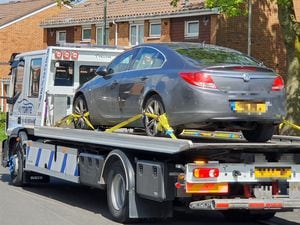Crime must not pay, so why won't courts make thugs hand over stolen money?

It is official: Crime does pay.
There can be no other conclusion after thug Ross Underwood was ordered to pay back a measly £1 after making £43,200 in attacks including a terrifying raid on a widow's home.
Underwood and two other men burst into the bedroom of a 53-year-old woman in Woodsetton and demanded money.
They pushed her down on her bed and fled with a £10,000 watch, a treasured keepsake that had belonged to her late husband.
Vile Underwood carried out a three-week robbery spree.
Why, then, did Wolverhampton Crown Court require he only hand back a nominal £1?
The answer is that he has no assets left.
Underwood's accomplice in some of his raids, although not the Woodsetton one, also ended up being made to pay just £1.
Richard Howell made £31,200 from crimes including dragging a driver from his car and raiding a shop with a crowbar.
The alternative to make so much money after tax would be for the men to be on a combined salary well in excess of £100,000 a year.
What sort of message of deterrent does this send to other would-be criminals who see vulnerable, law-abiding and hard-working people as easy prey?
It tells them that crime does pay as long as you spend it all quickly.
If David Cameron and the Conservatives are serious about tackling crime, or if Ed Miliband wants to improve upon Labour's rather dismal lead in the opinion polls, there is no pledge that will win near universal support more than to stamp out the absurdity of lenient sentences for criminals.
Underwood and Howell were jailed for seven years and three months and six years respectively. They will be back on the streets in half that time, their debt to society considered paid by the authorities.
Their victims will live with the trauma, fear and cost for many more years to come.
Anyone who believes in the rule of law and order would say that these thugs should be made to continue paying back their ill-gotten gains long after they are released from prison.
If they are truly without the means to pay, then back to prison they should go.
Cynics might suggest that it is not beyond the wit of a common criminal to squirrel away the money somewhere. That is not for us to say.
It was Tony Blair who said he would be 'tough on crime, tough on the causes of crime' but it is surely not too much to expect that of a Conservative Prime Minister, particularly one seeking a majority next year.
Fining parents is just another nonsensical sound bite.
Of all the nonsensical sound bites made in recent years, the idea of getting teachers to fine 'bad parents' for failing to read with their children must be one of the most ridiculous.
Ofsted's chief inspector Sir Michael Wilshaw suggests financial penalties for parents who miss open evenings, whose children do not do their homework or whose literacy is not up to par.
He suggests poverty is too often used as an excuse.
If this is the case, how does he suggest the fines will make any difference? Who is actually going to make families pay these fines? And are the courts really going to use the threat of prison to back them up when, as we have seen above, even hardened criminals prepared to rob a widow in her own home get off pathetically lightly as it is?
We understand entirely and agree with the level of concern there is about child literacy.
As a country we have to face the facts that there are youngsters in other countries such as China who will work for the companies that will be the major competitors for our own children once they are in the job market.
But unenforceable fines for not helping with the homework? Sir Michael, please don't insult our intelligence.





